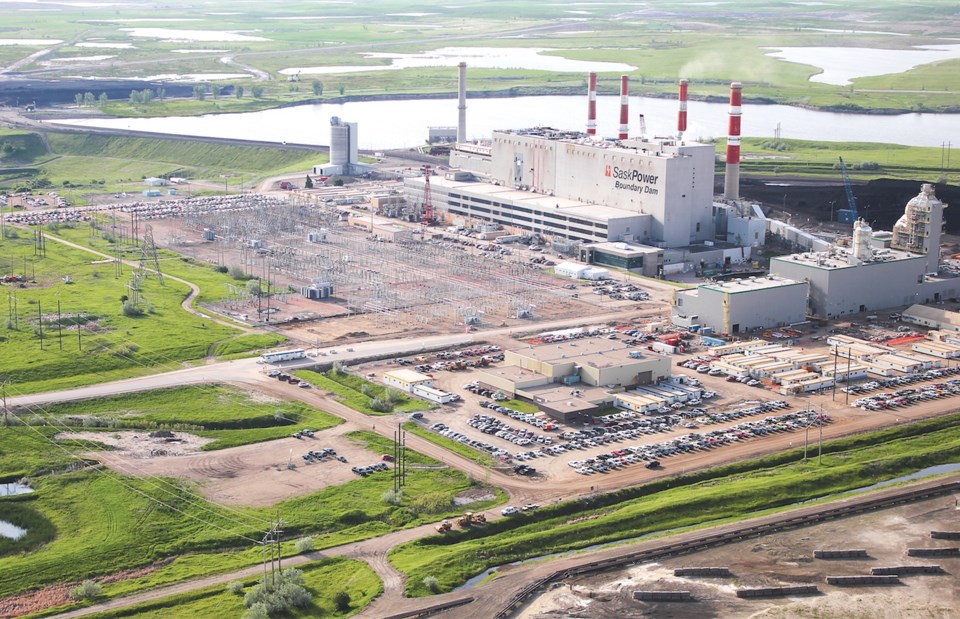ESTEVAN, CORONACH - Three coal-fired generating units at the Boundary Dam Power Station near Estevan, as well as the two units at the Poplar River Power Station near Coronach, could be getting an extension on their life cycles.
Jeremy Harrison, the minister responsible for SaskPower, was in southern Saskatchewan this week to meet with employees at the two power stations as well as elected officials from the City and RM of Estevan, the Town of Coronach and the RM of Hart Butte.
In an interview with SaskToday, he said the provincial government has given direction to SaskPower to look at reliability and affordability when it comes to the future of power production in the province.
"That really came out of what we heard in the [provincial] election campaign, and the focus that the public has, rightfully, on those two questions, on reliability and affordability, on a broader context, but they do go together when it comes to power production," said Harrison, who reported "very, very enthusiastic support" from both areas.
The government had said previously the Shand Power Station near Estevan would run to the end of its life in 2042 and Unit 3 at the Boundary Dam Power Station would also remain operational until its end-of-life date, since Unit 3 is connected to the carbon capture and storage facility at Boundary Dam. Now Harrison says the government will take a "very, very serious examination" whether refurbishing and extending the lives of Units 4, 5 and 6 at Boundary Dam and the two units at Poplar River makes sense while the province bridges to a nuclear future.
"What we have committed to is having those answers for our teams at Boundary Dam and Coronach by the summer, so we're working towards that. We really view this as being a very clear area. This is entirely provincial jurisdiction. I was very, very blunt when the federal clean electricity regulations were announced that the federal government has no place or no standing in this conversation. We are going to be taking a decision purely on what is best for this province, what is best for SaskPower and our customers."
There are technical discussions for both plants and the government has to ensure the economics work for both, he said.
Unit 4 at Boundary Dam was placed on standby in December 2021. SaskPower initially planned to retire the unit once the Great Plains Power Station near Moose Jaw came online – a milestone that was achieved in December. But Unit 4 remains connected to the province's power grid.
"I gave direction prior to Christmas that … [Unit 4] was not supposed to be decommissioned and retired. And that was obviously a part of what we were looking at already about that future that we were able to share with our staff in the last couple of days," Harrison said.
Unit 4 was online for 486 hours last year, or about 5.5 per cent of the year.
Unit 5 shifted to standby mode at the end of last year and can still be brought online in 48-72 hours.
Unit 6 at Boundary Dam and the two units at Poplar River remain online. Without a potential extension, BD6 would reach the end of its planned 50-year life by 2028, and Poplar River Units 1 and 2 would reach the end of their planned 50-year lives in 2031 and 2032.
If a refurbishment of the units was to occur, Harrison said a retrofit with carbon capture and storage (CCS) would be one option, but there are different elements that are going to be examined that would have an impact on power production and emission profiles.
As for Shand, Harrison said since the government plans to operate it until 2042, it will work through the other units first, and there will be time for decisions with the facility, which opened in the early 1990s.
"Shand will run until 2042. Period," said Harrison.
The CCS facility for Unit 3 at Boundary Dam was online for 85 per cent of the year, Harrison said, citing the year-end numbers for the facility that had yet to be released publicly as of Friday afternoon.
"We have really pioneered, working through, how this technology needs to be operated to work effectively. I think we're there. It has been a bit of a challenging process, and I think that's the case with any first-of-a-kind unit. I think we have a mature technology that we understand and we understand how it works."
Harrison noted the government has an objective of one million barrels per day of oil production in the province, and carbon injection has increased recovery rates in mature oilfields.
"So that will be part of the conversation as well about the broader economic impact that attaching carbon capture technology might have to existing or refurbished extended-life coal-generation facilities," he said.
The government's deeper look into the future of the units at Boundary Dam and Poplar River does not impact their plans for small modular reactors (SMRs). Premier Scott Moe announced last May that if SMRs were to go ahead in Saskatchewan, the first would be built in the Estevan area. A decision has yet to be announced on the exact location of that first SMR, which isn't expected to be finished for nearly a decade, thanks to the timelines required for the regulatory review process and construction.
Harrison reiterated his support for SMRs and the government's commitment to nuclear power.
"We hope to be able to operate on the timelines we had talked about as far as nuclear, but that would be over and above what we are doing here right now," said Harrison.





